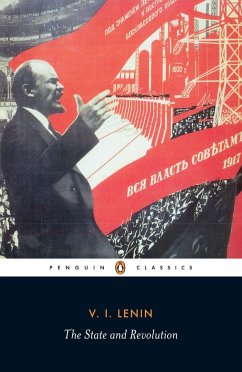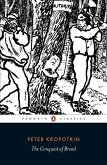19,99 €
inkl. MwSt.
Versandfertig in 2-4 Wochen

10 °P sammeln
- Broschiertes Buch
- Merkliste
- Auf die Merkliste
- Bewerten Bewerten
- Teilen
- Produkt teilen
- Produkterinnerung
- Produkterinnerung
Offers both the rationale for the new regime and insights into Leninist politics.
Andere Kunden interessierten sich auch für
![The Condition of the Working Class in England The Condition of the Working Class in England]() Friedrich EngelsThe Condition of the Working Class in England20,99 €
Friedrich EngelsThe Condition of the Working Class in England20,99 €![The Condition of the Working Class in England The Condition of the Working Class in England]() Friedrich EngelsThe Condition of the Working Class in England19,99 €
Friedrich EngelsThe Condition of the Working Class in England19,99 €![The Communist Manifesto The Communist Manifesto]() Friedrich EngelsThe Communist Manifesto15,99 €
Friedrich EngelsThe Communist Manifesto15,99 €![Capital Capital]() Karl MarxCapital27,99 €
Karl MarxCapital27,99 €![The Conquest of Bread The Conquest of Bread]() Peter KropotkinThe Conquest of Bread17,99 €
Peter KropotkinThe Conquest of Bread17,99 €![Cannabis: A History Cannabis: A History]() Martin BoothCannabis: A History21,99 €
Martin BoothCannabis: A History21,99 €![Margaret Thatcher Margaret Thatcher]() Charles MooreMargaret Thatcher27,99 €
Charles MooreMargaret Thatcher27,99 €-
-
-
Offers both the rationale for the new regime and insights into Leninist politics.
Hinweis: Dieser Artikel kann nur an eine deutsche Lieferadresse ausgeliefert werden.
Hinweis: Dieser Artikel kann nur an eine deutsche Lieferadresse ausgeliefert werden.
Produktdetails
- Produktdetails
- Classic, 20th-Century, Penguin
- Verlag: Penguin Books UK
- Artikelnr. des Verlages: 21591
- Revised edition
- Seitenzahl: 192
- Erscheinungstermin: 4. Mai 1993
- Englisch
- Abmessung: 196mm x 128mm x 12mm
- Gewicht: 148g
- ISBN-13: 9780140184358
- ISBN-10: 014018435X
- Artikelnr.: 21622190
- Herstellerkennzeichnung
- Libri GmbH
- Europaallee 1
- 36244 Bad Hersfeld
- gpsr@libri.de
- Classic, 20th-Century, Penguin
- Verlag: Penguin Books UK
- Artikelnr. des Verlages: 21591
- Revised edition
- Seitenzahl: 192
- Erscheinungstermin: 4. Mai 1993
- Englisch
- Abmessung: 196mm x 128mm x 12mm
- Gewicht: 148g
- ISBN-13: 9780140184358
- ISBN-10: 014018435X
- Artikelnr.: 21622190
- Herstellerkennzeichnung
- Libri GmbH
- Europaallee 1
- 36244 Bad Hersfeld
- gpsr@libri.de
Vladimir Lenin was born in 1870 and was one of the most influential people of the 20th century. He became a Russian revolutionary, a communist politician, the principal leader of the October Revolution, the first head of the Russian Soviet Socialist Republic and, from 1922, the first de facto leader of the Soviet Union.
Translator's Notes
Introduction:
The Writing of the Book
The Contents
The Style
A Marxist Interpretation?
The Book and Political Theory
Political Conditions at the Time
The Book is Published
The Uses of the Book
The Book and Its Fate
THE STATE AND REVOLUTION
Preface to the First Edition
Preface to the Second Edition
Chapter I: Class Society and the State
1. The State as the Product of the Irreconcilability of Class
Contradictions
2. Special Bodies of Armed Men, Prisons, Etc.
3. The State as an Instrument for the Exploitation of the Oppressed Class
4. The "Withering Away" of the State and Violent Revolution
Chapter II: The State and RevolutionThe Experience of 1848-51
1. The Eve of the Revolution
2. The Revolution in Summary
3. The Presentation of the Question by Marx in 1852
Chapter III: The State and RevolutionThe Experience of the Paris Commune
of 1871Marx's Analysis
1. What was Heroic about the Communards' Attempt?
2. With What is the Smashed State Machine to be Replaced?
3. The Eradication of Parliamentarianism
4. Organization of the Unity of the Nation
5. The Destruction of the Parasite State
Chapter IV: Continuation: Supplementary Clarifications by Engels
1. The Housing Question
2. The Polemic with the Anarchists
3. Letter to Bebel
4. Critique of the Draft of the Erfurt Programme
5. The 1891 Preface to Marx's The Civil War in France
6. Engels on the Overpowering of Democracy
Chapter V: The Economic Basis for the Withering Away of the State
1. The Presentation of the Question by Marx
2. The Transition from Capitalism to Communism
3. The First Phase of Communist Society
4. The Higher Phase of Communist Society
Chapter VI: The Vulgarization of Marxism by the Opportunists
1. Plekhanov's Polemic with the Anarchists
2. Kautsky's Polemic with the Opportunists
3. Kautsky's Polemic with Pannekoek
Chapter VII: The Experience of the Russian Revolutions of 1905 and 1917
#unfinished text#
Postscript to the First EditionGlossary
Introduction:
The Writing of the Book
The Contents
The Style
A Marxist Interpretation?
The Book and Political Theory
Political Conditions at the Time
The Book is Published
The Uses of the Book
The Book and Its Fate
THE STATE AND REVOLUTION
Preface to the First Edition
Preface to the Second Edition
Chapter I: Class Society and the State
1. The State as the Product of the Irreconcilability of Class
Contradictions
2. Special Bodies of Armed Men, Prisons, Etc.
3. The State as an Instrument for the Exploitation of the Oppressed Class
4. The "Withering Away" of the State and Violent Revolution
Chapter II: The State and RevolutionThe Experience of 1848-51
1. The Eve of the Revolution
2. The Revolution in Summary
3. The Presentation of the Question by Marx in 1852
Chapter III: The State and RevolutionThe Experience of the Paris Commune
of 1871Marx's Analysis
1. What was Heroic about the Communards' Attempt?
2. With What is the Smashed State Machine to be Replaced?
3. The Eradication of Parliamentarianism
4. Organization of the Unity of the Nation
5. The Destruction of the Parasite State
Chapter IV: Continuation: Supplementary Clarifications by Engels
1. The Housing Question
2. The Polemic with the Anarchists
3. Letter to Bebel
4. Critique of the Draft of the Erfurt Programme
5. The 1891 Preface to Marx's The Civil War in France
6. Engels on the Overpowering of Democracy
Chapter V: The Economic Basis for the Withering Away of the State
1. The Presentation of the Question by Marx
2. The Transition from Capitalism to Communism
3. The First Phase of Communist Society
4. The Higher Phase of Communist Society
Chapter VI: The Vulgarization of Marxism by the Opportunists
1. Plekhanov's Polemic with the Anarchists
2. Kautsky's Polemic with the Opportunists
3. Kautsky's Polemic with Pannekoek
Chapter VII: The Experience of the Russian Revolutions of 1905 and 1917
#unfinished text#
Postscript to the First EditionGlossary
Translator's Notes
Introduction:
The Writing of the Book
The Contents
The Style
A Marxist Interpretation?
The Book and Political Theory
Political Conditions at the Time
The Book is Published
The Uses of the Book
The Book and Its Fate
THE STATE AND REVOLUTION
Preface to the First Edition
Preface to the Second Edition
Chapter I: Class Society and the State
1. The State as the Product of the Irreconcilability of Class
Contradictions
2. Special Bodies of Armed Men, Prisons, Etc.
3. The State as an Instrument for the Exploitation of the Oppressed Class
4. The "Withering Away" of the State and Violent Revolution
Chapter II: The State and RevolutionThe Experience of 1848-51
1. The Eve of the Revolution
2. The Revolution in Summary
3. The Presentation of the Question by Marx in 1852
Chapter III: The State and RevolutionThe Experience of the Paris Commune
of 1871Marx's Analysis
1. What was Heroic about the Communards' Attempt?
2. With What is the Smashed State Machine to be Replaced?
3. The Eradication of Parliamentarianism
4. Organization of the Unity of the Nation
5. The Destruction of the Parasite State
Chapter IV: Continuation: Supplementary Clarifications by Engels
1. The Housing Question
2. The Polemic with the Anarchists
3. Letter to Bebel
4. Critique of the Draft of the Erfurt Programme
5. The 1891 Preface to Marx's The Civil War in France
6. Engels on the Overpowering of Democracy
Chapter V: The Economic Basis for the Withering Away of the State
1. The Presentation of the Question by Marx
2. The Transition from Capitalism to Communism
3. The First Phase of Communist Society
4. The Higher Phase of Communist Society
Chapter VI: The Vulgarization of Marxism by the Opportunists
1. Plekhanov's Polemic with the Anarchists
2. Kautsky's Polemic with the Opportunists
3. Kautsky's Polemic with Pannekoek
Chapter VII: The Experience of the Russian Revolutions of 1905 and 1917
#unfinished text#
Postscript to the First EditionGlossary
Introduction:
The Writing of the Book
The Contents
The Style
A Marxist Interpretation?
The Book and Political Theory
Political Conditions at the Time
The Book is Published
The Uses of the Book
The Book and Its Fate
THE STATE AND REVOLUTION
Preface to the First Edition
Preface to the Second Edition
Chapter I: Class Society and the State
1. The State as the Product of the Irreconcilability of Class
Contradictions
2. Special Bodies of Armed Men, Prisons, Etc.
3. The State as an Instrument for the Exploitation of the Oppressed Class
4. The "Withering Away" of the State and Violent Revolution
Chapter II: The State and RevolutionThe Experience of 1848-51
1. The Eve of the Revolution
2. The Revolution in Summary
3. The Presentation of the Question by Marx in 1852
Chapter III: The State and RevolutionThe Experience of the Paris Commune
of 1871Marx's Analysis
1. What was Heroic about the Communards' Attempt?
2. With What is the Smashed State Machine to be Replaced?
3. The Eradication of Parliamentarianism
4. Organization of the Unity of the Nation
5. The Destruction of the Parasite State
Chapter IV: Continuation: Supplementary Clarifications by Engels
1. The Housing Question
2. The Polemic with the Anarchists
3. Letter to Bebel
4. Critique of the Draft of the Erfurt Programme
5. The 1891 Preface to Marx's The Civil War in France
6. Engels on the Overpowering of Democracy
Chapter V: The Economic Basis for the Withering Away of the State
1. The Presentation of the Question by Marx
2. The Transition from Capitalism to Communism
3. The First Phase of Communist Society
4. The Higher Phase of Communist Society
Chapter VI: The Vulgarization of Marxism by the Opportunists
1. Plekhanov's Polemic with the Anarchists
2. Kautsky's Polemic with the Opportunists
3. Kautsky's Polemic with Pannekoek
Chapter VII: The Experience of the Russian Revolutions of 1905 and 1917
#unfinished text#
Postscript to the First EditionGlossary







